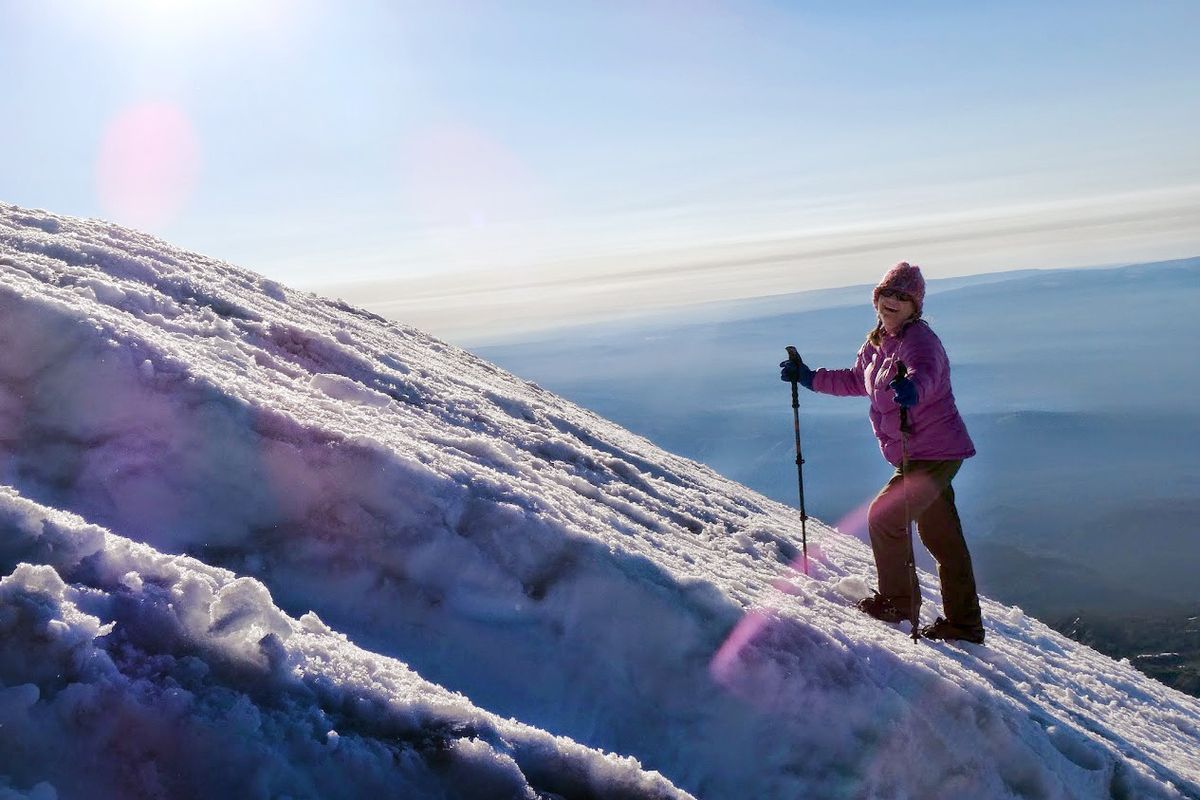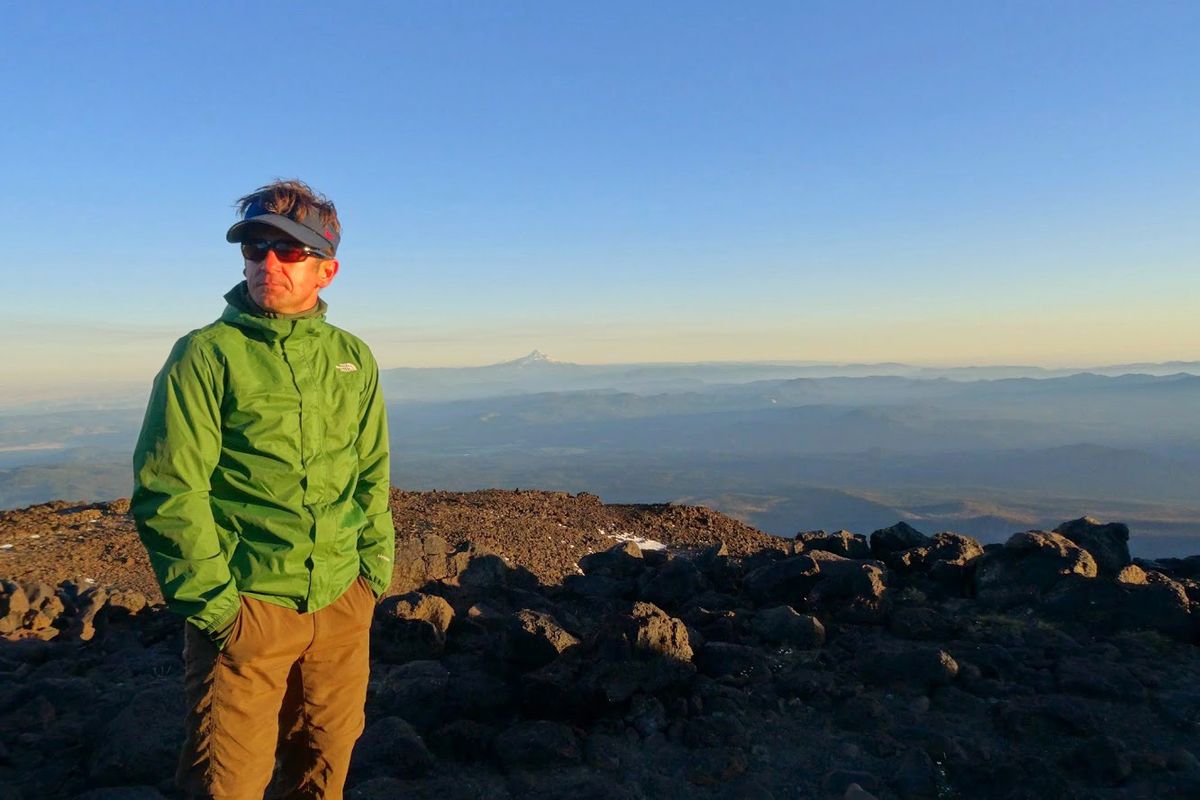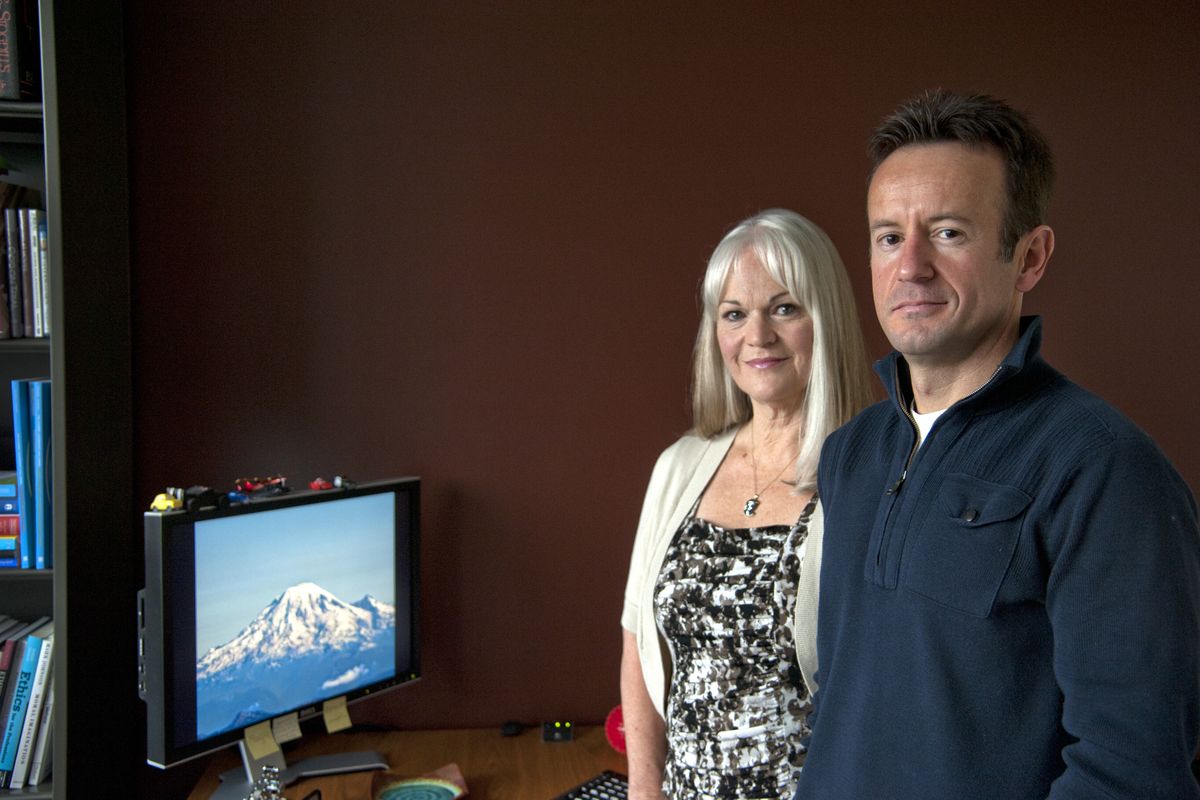Woman reaches high point through GU program
As part of the Organizational Leadership Program at Gonzaga University, Marcy Kennedy joined Adrian Popa’s class to climb Mount Adams. Kennedy coordinates GU’s nursing program. A photo of Mount Rainier, shot from Mount Adams, is on Popa’s computer. (Dan Pelle)Buy a print of this photo
Marcy Kennedy is a serious baby boomer – divorcing after 37 years, adjusting to an empty nest, caring for her 91-year-old father and climbing Mount Adams, at 12,276 feet the second highest peak in Washington.
All were inevitable, except nobody, especially her three adult sons, could fathom Kennedy with crampons and an ice ax scrambling over lava rocks and glacier, through thin oxygen, to the summit of a mountain. She took them camping once as young children, but it was too dirty, too wet and too much cooking.
The sons encouraged Kennedy to pick a safer – indoor – elective to complete her master’s degree at Gonzaga University, where she works as the coordinator of the nursing department.
“They said ‘No, Mom. You can’t do that, you’re a fluff. You’re like a house flower,’ ” Kennedy said, using a rugged tough-guy voice. “I’m not really outdoorsy. I like to walk but I’m not out kayaking or anything.”
The boys’ lack of confidence ignited Kennedy’s sense of “can do” and put her at the base of Mount Adams in July with a dozen other students ranging in age and physical ability. Turning 62 in a few days, Kennedy was the oldest in the group and stood out with her pink jacket, lip gloss and lavender-scented body wipes.
“I had the idealistic plan of climbing the mountain up as one person and down as another,” Kennedy said.
Kennedy came off the mountain the same person – only with more self awareness, resiliency and a big-picture view of her journey through life. She also knows that the only way she reached the summit was because of teamwork among the students, both physically and emotionally.
“The beauty is it’s not the mountain that makes the experience,” said professor Adrian Popa, who has taken four classes to the summit of Mount Adams. “It’s the psychological, social and spiritual journey on the trip there.”
Popa, chairman of the Organizational Leadership Program, created the Leadership and Hardiness class, which is open to everyone, anywhere, not just Gonzaga graduate students.
The summer course is online except for the Mount Adams climb, a mountain chosen for its accessibility and relatively safe environment. He describes it as “leadership with shoes on. You walk the talk.” The class embraces the Aristotelian tradition: “For the things we have to learn before we can do them, we learn by doing them.”
It’s one of few university courses across the country that incorporates an actual mountain climb. When asked why, Popa answered with “why not.”
“Here we are in the Northwest,” said Popa, a Romanian immigrant whose parents fled Communist rule – an experience that influenced his interest in the relationship of adversity and resilience. “We are immersed in opportunity.”
The mountaineering forces students out of their comfort zone, but the leadership and resiliency principles of the course work help them prepare mentally and reflect on how they cope with adversity in their lives and in their work.
The students study Viktor Frankl’s classic “Man’s Search for Meaning,” which records his struggle to find meaning in his existence at Auschwitz. The students – no matter their age or background – learn the mental and spiritual journey is much tougher than the physical struggle.
“I compared the climb to my life over the last two years, which has been heartbreakingly difficult at times,” Kennedy wrote on the class blog, reflecting just days after the trek. “Could I make it through challenge after challenge? But taking rests in my life as well as on the mountain, I found the moments to gather courage and strength to refocus and put all of my hardy attitudes together and face each ridge as I faced those in my life.”
By 8,000 feet, Kennedy’s exhausted and undertrained body weakened and screamed for relief. At times all she could do was count five steps and then rest. One step. Rest. Her inner lip sunburned from “sucking wind and panting” as she crept up the mountain as her teammate, a much younger and physically fit man, walked backward the majority of the time encouraging Kennedy. At one point, Popa asked everyone capable to take some of the things from Kennedy’s 40-pound pack. Eventually, Popa stashed her pack on the trail.
“I used up everything I had and took the rest of what I needed from my team,” Kennedy wrote. “That’s the only way I made it up the mountain.”
For Kennedy and for most of the students, the important lesson was nobody reached the top alone. It took a team. And for the few students who didn’t make the summit, they still achieved their goal and were part of the whole.
In his blog reflections, Kennedy’s climbing partner, Chris Baldwin, admitted wondering if his ego would get in the way or if he would turn back with her if she didn’t summit. He said these questions got to the core of the class’ conversations on hardiness. In the end, he did everything possible to help Kennedy summit, which to him equaled success and true leadership.
“The persistence of Marcy and the rewarding experience we shared when we overcame our doubts will be a reminder of the satisfaction that comes from supporting individuals in our organizational life,” he wrote. “As leaders we have the opportunity to help others create meaning and encounter success.”
Kennedy wasn’t the only baby boomer in the class. She was joined by two other men, a business manager originally from Egypt and a Kaiser Aluminum worker who had taken the class previously and has attempted to summit several times. Although their physical strength wasn’t tops, they all added something to the group, whether humor, wisdom or a kind smile and good food once everyone returned to the cars, Popa said.
He added that some of the most physically fit students have struggled mentally, especially with ego. He’s had executives who rule in the boardroom reach the summit without problem but burn relationships on the way up. The hope is in the end everyone finds collective strength and learns from how they handled adversity and ultimately use this new information in the future.
Popa said his baby boomer students are always asking different questions than their younger classmates, who are still in the building of life stage.
He said boomers are good at breaking the climb into segments and realizing the need for stillness and reflection.
“Boomers ask ‘Can I make my life count,’ ” he said.
Popa said he learned much from Kennedy and in reflecting on Frankl’s writings said she accepted “her fate and all of the suffering or toils it entailed” to add deeper meaning to her life.
In an email recently to Popa, Kennedy added context to the July experience and the importance of team.
“Even not making it to the mountain summit would have been fine because I know how hard I worked but much of the reward of achieving that final summit climb was the joy and satisfaction of giving my teammates the feeling that they had championed and supported a worthwhile cause in getting me up the mountain,” she wrote.
As for Kennedy’s sons, they realized their mother has grit. They all used the word “proud.”
Her response: “I climbed a mountain. Ha. Ha. It was a total high point in my life.”


